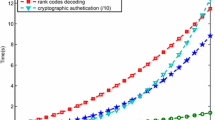Abstract
The McEliece cryptosystem based on quasi-cyclic low-density parity check (QC-LDPC) codes is presented to offer both security and error-correction simultaneously in the determined network coding system. The characteristics of the cryptosystem make it does not need to reduce information rate additionally to offer security. The messages u is encoded into x with QC-LDPC. x is transmitted through a network where a network coding error-correcting scheme is performed. \(\rho \) links are observed by the adversary and t errors occur in the network. The characteristic of MDS code make the errors cannot be spread, therefore, the corrupted packets which occur in t links will cause at most t errors in the received messages in the sink. As long as the number of errors occuring in the intermediate links will not exceed the minimum distance of QC-LDPC codes, the hybrid scheme can perform error-correcting and security simultaneously. The information rate reaches \({\mathrm{n}} - 2t\) instead of \({\mathrm{n}} - \mu - 2t\) where n is the max-flow min-cut.






Similar content being viewed by others
References
Talooki, V.N., Bassoli, R., Lucani, D.E., Rodriguez, J., Fitzek, F.H.P., Marques, H., Tafazolli, R.: Security concerns and countermeasures in network coding based communication systems: a survey. Comput. Netw. 83, 422–445 (2015)
Yu, Z., Wei, Y., Ramkumar, B., Guan, Y.: An efficient scheme for securing XOR network coding against pollution attacks. In: INFOCOM, pp. 406–414 (2009)
Gkantsidis, C., Rodriguez, P.R.: Cooperative security for network coding file distribution. In: INFOCOM 2006. IEEE International Conference on Computer Communications. Proceedings, pp. 1–13 (2006)
Zhao, K., Chu, X., Wang, M., Jiang, Y.: Speeding up homomorpic hashing using gpus. In: IEEE International Conference on Communications, pp. 856–860 (2009)
Islam, M.S., Kim, J.M.: Gpu-based fast error recovery for high speed data communication in media technology. Clust. Comput. 18(1), 93–101 (2015)
Jiang, H., Chen, Y., Qiao, Z., Weng, T.H., Li, K.C.: Scaling up mapreduce-based big data processing on multi-gpu systems. Clust. Comput. 18(1), 369–383 (2015)
Wang, Q., Long, V., Nahrstedt, K., Khurana, H.: Mis: malicious nodes identification scheme in network-coding-based peer-to-peer streaming. In: Conference on Information Communications, pp. 296–300 (2010)
Yang, S., Yeung, R.W., Chi, K.N.: Refined coding bounds and code constructions for coherent network error correction. IEEE Trans. Inf. Theory 57(3), 1409–1424 (2009)
Xuan, G., Fu, F.W., Zhang, Z.: Construction of network error correction codes in packet networks. In: International Symposium on NETWORKING Coding, pp. 1–6 (2011)
Matsumoto, R.: Construction algorithm for network error-correcting codes attaining the singleton bound. IEICE Trans. Fundam. Electron. Commun. Comput. Sci. E90–A(9), 1729–1735 (2007)
Yang, S., Yeung, R.W.: Characterizations of network error correction/detection and erasure correction. Proc Netcod (2007)
Zhang, Z.: Linear network error correction codes in packet networks. IEEE Trans. Inf. Theory 54(1), 209–218 (2008)
Jaggi, S., Langberg, M., Katti, S., Ho, T., Katabi, D., Medard, M., Effros, M.: Resilient network coding in the presence of byzantine adversaries. IEEE Trans. Inf. Theory 54(6), 2596–2603 (2008)
Silva, D., Kschischang, F.R., Koetter, R.: A rank-metric approach to error control in random network coding. IEEE Trans. Inf. Theory 54(9), 3951–3967 (2008)
Silva, D., Kschischang, F.R.: Using rank-metric codes for error correction in random network coding. In: IEEE International Symposium on Information Theory, pp. 796–800 (2007)
Siavoshani, M.J., Fragouli, C., Diggavi, S.N.: Subspace properties of network coding and their applications. IEEE Trans. Inf. Theory 58(5), 2599–2619 (2012)
Silva, D., Kschischang, F.R.: Security for wiretap networks via rank-metric codes. In: IEEE International Symposium on Information Theory, pp. 176–180 (2007)
Koetter, R., Kschischang, F.R.: Coding for errors and erasures in random network coding. IEEE Trans. Inf. Theory 54(8), 3579–3591 (2007)
Ngai, C.K., Yang, S.: Deterministic secure error-correcting (sec) network codes. In: The Workshop on Network Coding, pp. 96–101 (2009)
Silva, D., Kschischang, F.R.: Universal secure error-correcting schemes for network coding. In: IEEE International Symposium on Information Theory Proceedings, pp. 2428–2432 (2010)
Silva, D., Kschischang, F.R.: Universal secure network coding via rank-metric codes. IEEE Trans. Inf. Theory 57(2), 1124–1135 (2011)
Mceliece, R.J.: A public-key cryptosystem based on algebraic coding theory. Deep Space Network Progress Report, pp. 114–116 (1978)
Baldi, M., Chiaraluce, F.: Cryptanalysis of a new instance of McEliece cryptosystem based on QC-LDPC codes. In: IEEE International Symposium on Information Theory, pp. 2591–2595 (2007)
Sanders, P., Egner, S., Tolhuizen, L.: Polynomial time algorithms for network information flow. ACM Symposium on Parallel Algorithms and Architectures, pp. 286–294 (2003)
Yu, Z., Wei, Y., Ramkumar, B., Guan, Y.: An efficient signature-based scheme for securing network coding against pollution attacks. In: INFOCOM 2008. the Conference on Computer Communications. IEEE, pp. 1409–1417 (2008)
Venturelli, R.B., Silva, D.: An evaluation of erasure decoding algorithms for gabidulin codes. In: Telecommunications Symposium, pp. 1–5 (2014)
Rashwan, H., Gabidulin, E.M., Honary, B.: Security of the GPT cryptosystem and its applications to cryptography. Secur. Commun. Netw. 4(8), 937–946 (2011)
Wang, L., Yang, Y., Zhao, W.: Network coding-based multipath routing for energy efficiency in wireless sensor networks. Eurasip J. Wirel. Commun. Netw. 2012(1), 115 (2012)
Chou, P.A., Wu, Y.: Practical network coding. In: Conference on Information Communications (2003)
Guo, Z., Wang, B., Xie, P., Zeng, W., Cui, J.H.: Efficient error recovery with network coding in underwater sensor networks. Ad Hoc Netw. 7(4), 791–802 (2009)
Acknowledgements
This work is supported by the fundamental research funds for Heilongjiang provincial universities (the study on error spreading depression in network coding), Suihua technology office program (SHKJ2015-015, SHKJ2015-014 ), National Science Foundation of China (61571150), Education Office of Heilongjiang Province Science and Technology Program (2016-KYYWF-0937), Suihua University Program (K1502003).
Author information
Authors and Affiliations
Corresponding author
Rights and permissions
About this article
Cite this article
Zhang, G., Cai, S. Universal secure error-correcting (SEC) schemes for network coding via McEliece cryptosystem based on QC-LDPC codes. Cluster Comput 22 (Suppl 2), 2599–2610 (2019). https://doi.org/10.1007/s10586-017-1354-x
Received:
Revised:
Accepted:
Published:
Issue Date:
DOI: https://doi.org/10.1007/s10586-017-1354-x




